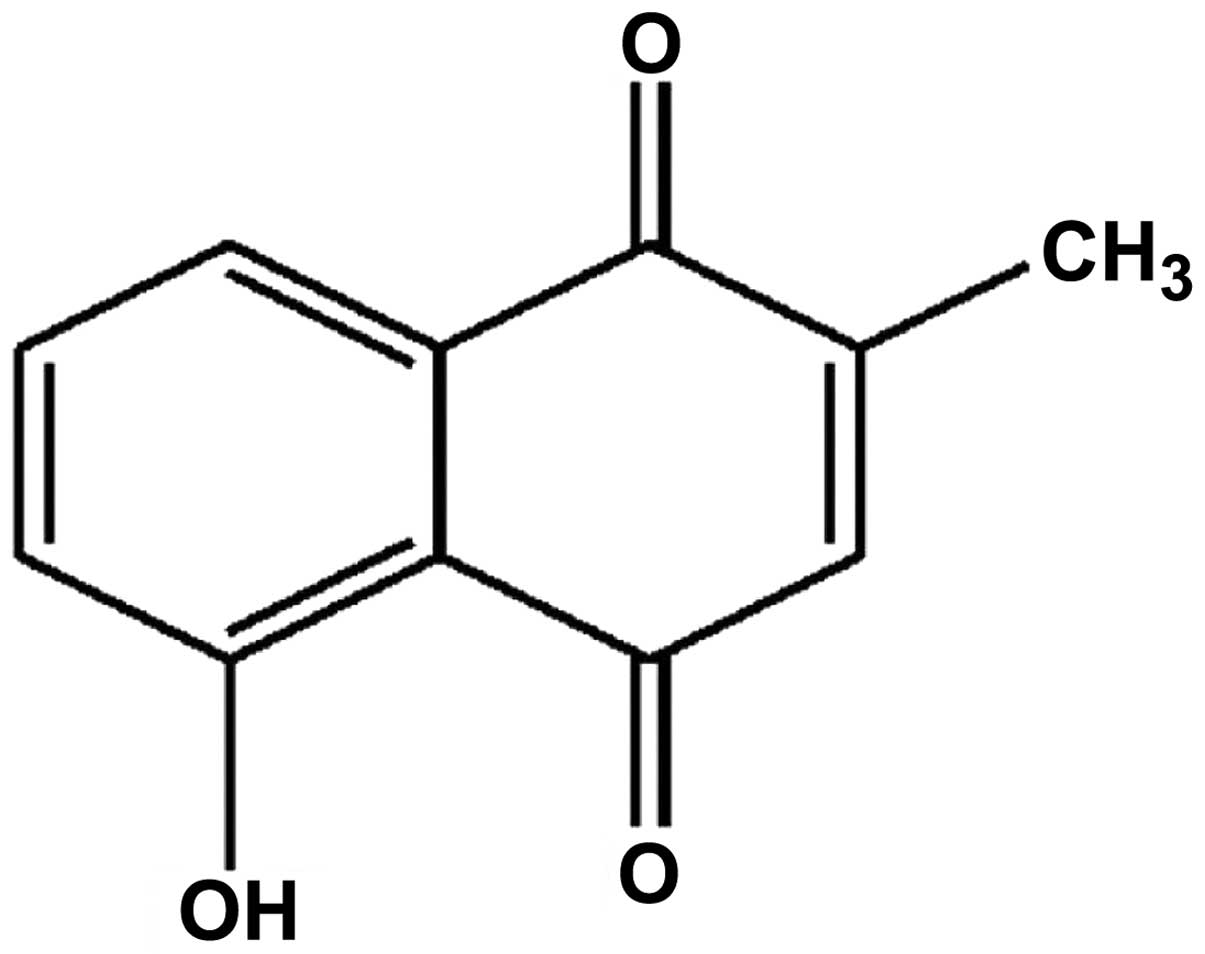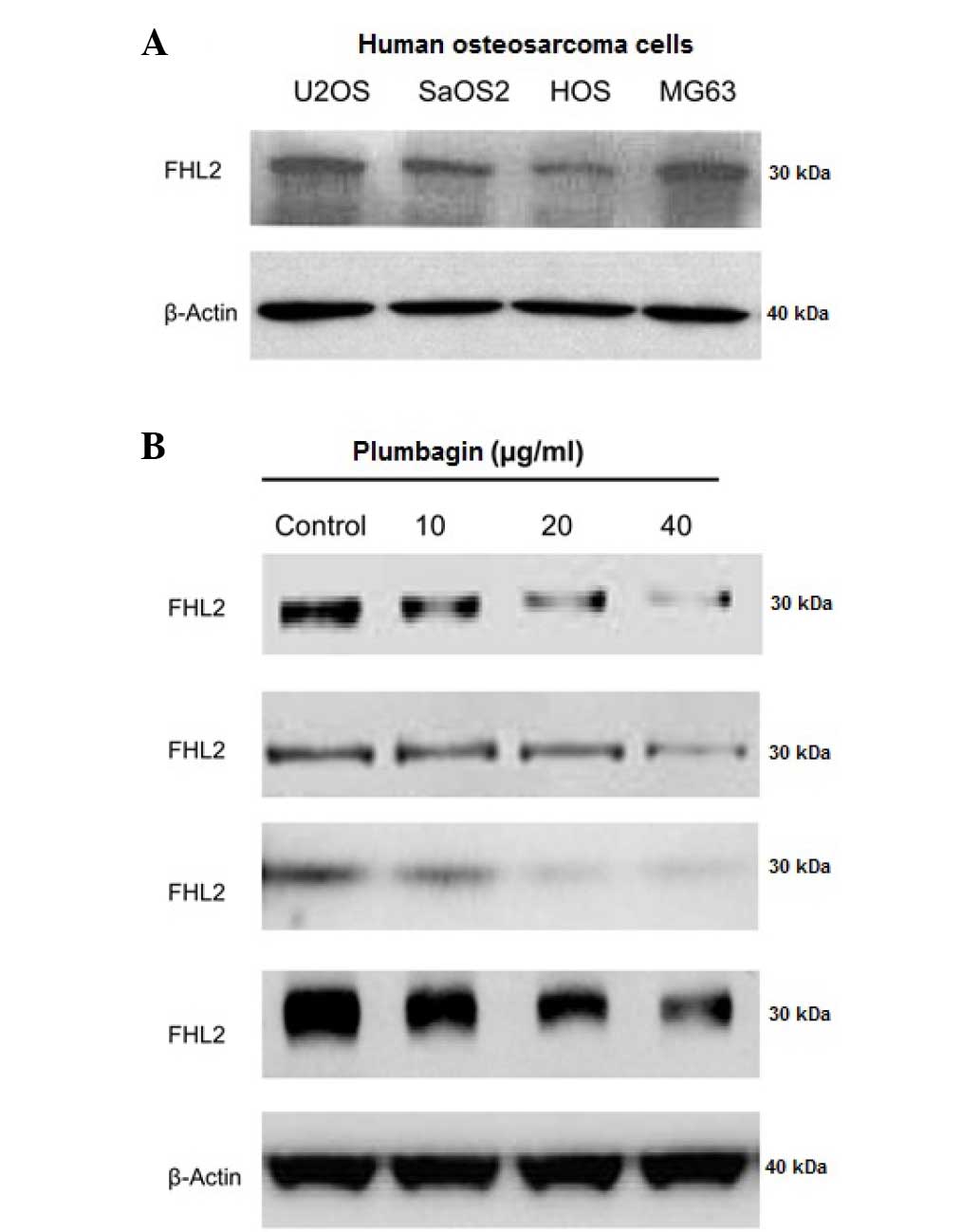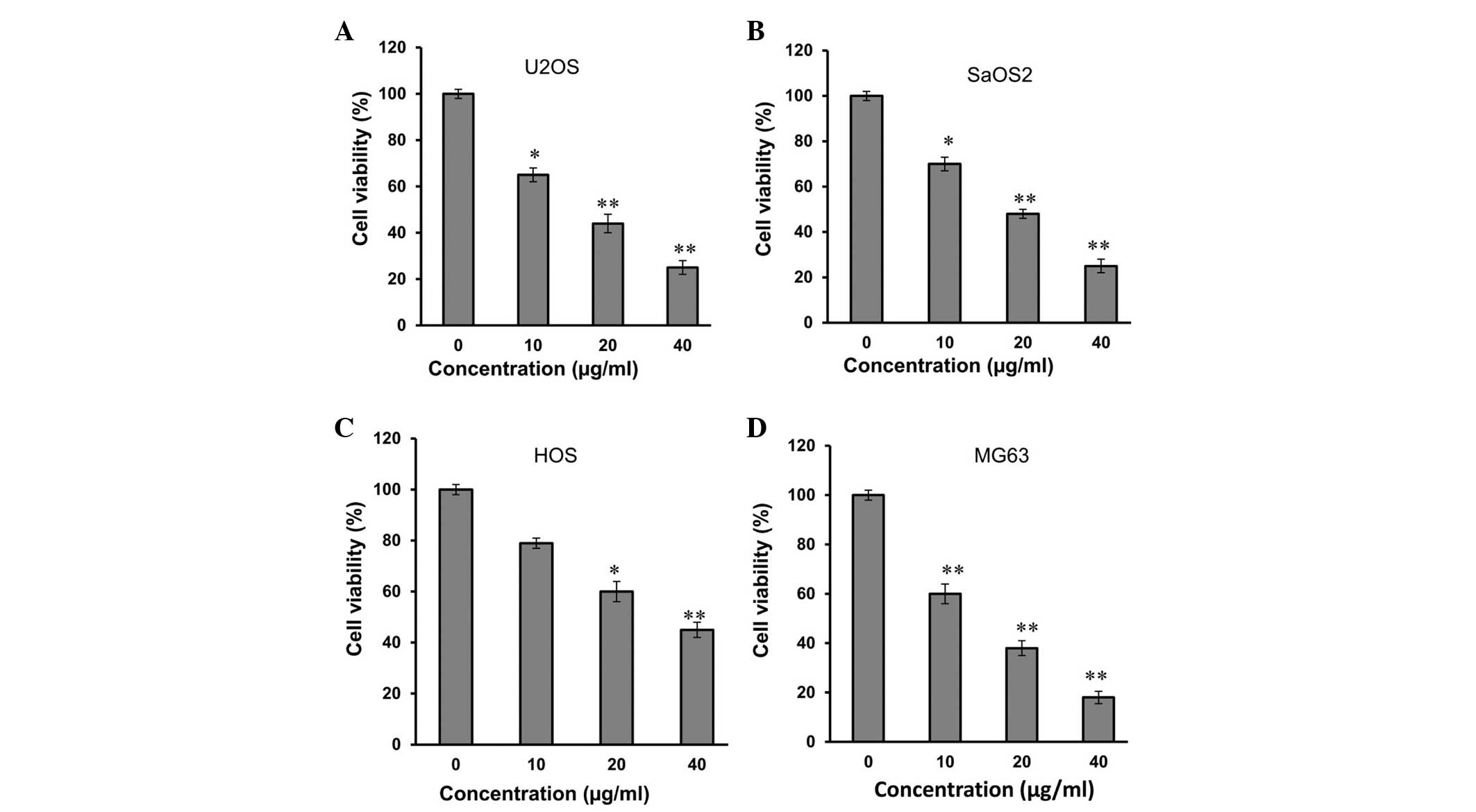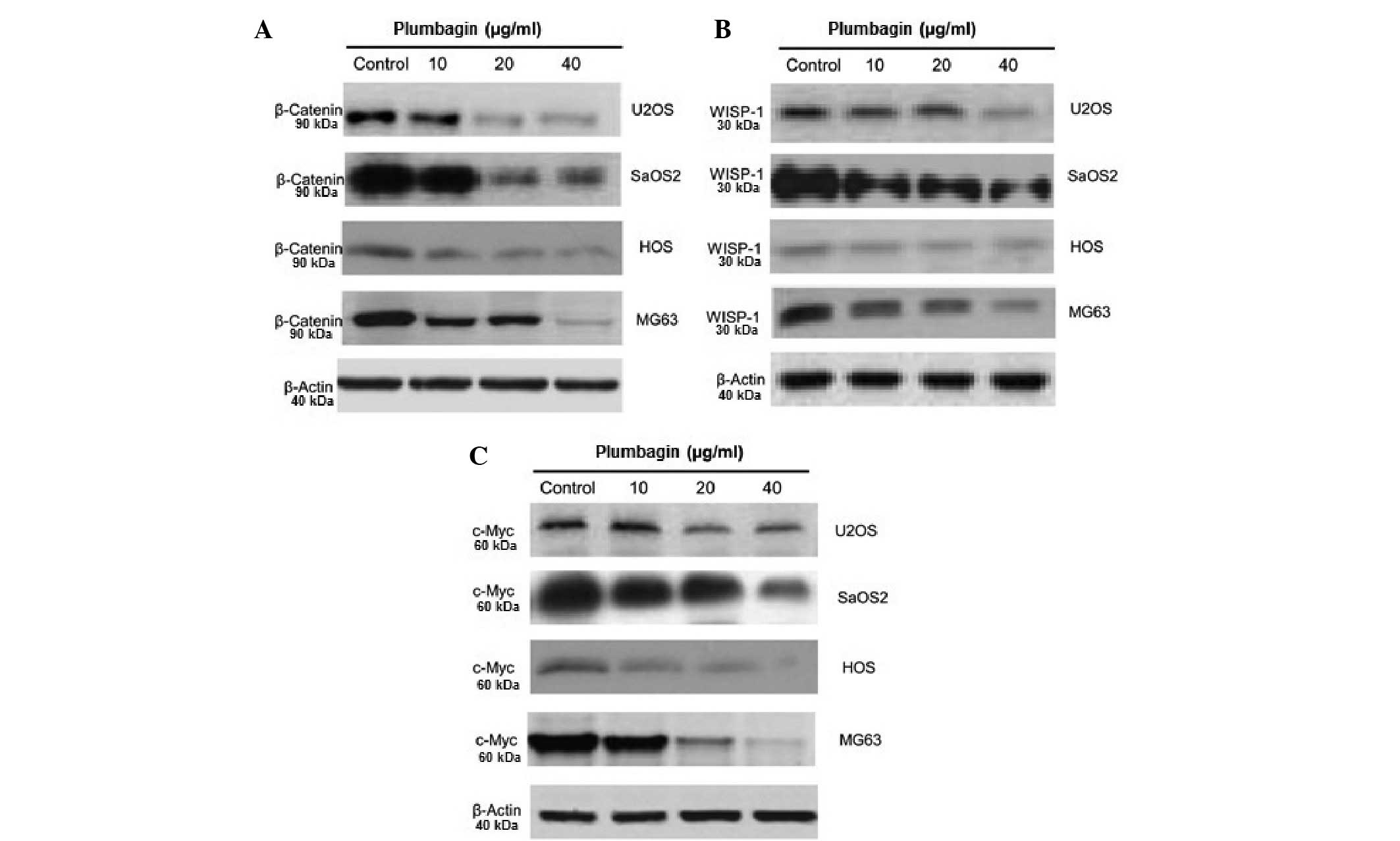|
1
|
Ottaviani G and Jaffe N: The epidemiology
of osteosarcoma. Pediatric and Adolescent Osteosarcoma. Jaffe N,
Bruland OS and Bielack S: Springer; New York, NY: pp. pp3–13. 2009,
View Article : Google Scholar
|
|
2
|
Guijarro MV, Ghivizzani SC and Gibbs CP:
Animal models in osteosarcoma. Front Oncol. 4:1892014. View Article : Google Scholar : PubMed/NCBI
|
|
3
|
Luetke A, Meyers PA, Lewis I and Juergens
H: Osteosarcoma treatment-where do we stand? A state of the art
review. Cancer Treat Rev. 40:523–532. 2014. View Article : Google Scholar : PubMed/NCBI
|
|
4
|
Weeraratna AT, Jiang Y, Hostetter G,
Rosenblatt K, Duray P, Bittner M and Trent JM: Wnt5a signaling
directly affects cell motility and invasion of metastatic melanoma.
Cancer Cell. 1:279–288. 2002. View Article : Google Scholar : PubMed/NCBI
|
|
5
|
Wissmann C, Wild PJ, Kaiser S, Roepcke S,
Stoehr R, Woenckhaus M, Kristiansen G, Hsieh JC, Hofstaedter F,
Hartmann A, et al: WIF-1, a component of the Wnt pathway, is
down-regulated in prostate, breast, lung and bladder cancer. J
Pathol. 201:204–212. 2003. View Article : Google Scholar : PubMed/NCBI
|
|
6
|
Hoang BH, Kubo T, Healey JH, Yang R,
Nathan SS, Kolb EA, Mazza B, Meyers PA and Gorlick R: Dickkopf 3
inhibits invasion and motility of SaOS-2 osteosarcoma cells by
modulating the Wnt-beta-catenin pathway. Cancer Res. 64:2734–2739.
2004. View Article : Google Scholar : PubMed/NCBI
|
|
7
|
Barker N and Clevers H: Mining the Wnt
pathway for cancer therapeutics. Nat Rev Drug Discov. 5:997–1014.
2006. View
Article : Google Scholar : PubMed/NCBI
|
|
8
|
Lin YC, You L, Xu Z, He B, Mikami I, Thung
E, Chou J, Kuchenbecker K, Kim J, Raz D, et al: Wnt signaling
activation and WIF-1 silencing in nasopharyngeal cancer cell lines.
Biochem Biophys Res Commun. 341:635–640. 2006. View Article : Google Scholar : PubMed/NCBI
|
|
9
|
Huelsken J and Birchmeier W: New aspects
of Wnt signaling pathways in higher vertebrates. Curr Opin Genet
Dev. 11:547–553. 2001. View Article : Google Scholar : PubMed/NCBI
|
|
10
|
Mlodzik M: Planar cell polarization: Do
the same mechanisms regulate Drosophila tissue polarity and
vertebrate gastrulation? Trends Genet. 18:564–571. 2002. View Article : Google Scholar : PubMed/NCBI
|
|
11
|
Clevers H: Wnt/beta-catenin signaling in
development and disease. Cell. 127:469–480. 2006. View Article : Google Scholar : PubMed/NCBI
|
|
12
|
Westendorf JJ, Kahler RA and Schroeder TM:
Wnt signaling in osteoblasts and bone diseases. Gene. 341:19–39.
2004. View Article : Google Scholar : PubMed/NCBI
|
|
13
|
Rawadi G and Roman-Roman S: Wnt signalling
pathway: A new target for the treatment of osteoporosis. Expert
Opin Ther Targets. 9:1063–1077. 2005. View Article : Google Scholar : PubMed/NCBI
|
|
14
|
Haydon RC, Deyrup A, Ishikawa A, Heck R,
Jiang W, Zhou L, Feng T, King D, Cheng H, Breyer B, et al:
Cytoplasmic and/or nuclear accumulation of the beta-catenin protein
is a frequent event in human osteosarcoma. Int J Cancer.
102:338–342. 2002. View Article : Google Scholar : PubMed/NCBI
|
|
15
|
Reya T and Clevers H: Wnt signalling in
stem cells and cancer. Nature. 434:843–850. 2005. View Article : Google Scholar : PubMed/NCBI
|
|
16
|
Espada J, Calvo MB, Diaz-Prado S and
Medina V: Wnt signaling and cancer stem cells. Clin Transl Oncol.
11:411–427. 2009. View Article : Google Scholar : PubMed/NCBI
|
|
17
|
Wu CL, Tsai HC, Chen ZW, Wu CM, Li TM,
Fong YC and Tang CH: Ras activation mediates WISP-1-induced
increases in cell motility and matrix metalloproteinase expression
in human osteosarcoma. Cell Signal. 25:2812–2822. 2013. View Article : Google Scholar : PubMed/NCBI
|
|
18
|
Kadrmas JL and Beckerle MC: The LIM
domain: From the cytoskeleton to the nucleus. Nat Rev Mol Cell
Biol. 5:920–931. 2004. View
Article : Google Scholar : PubMed/NCBI
|
|
19
|
Gabriel B, Fischer DC, Orlowska-Volk M,
zur Hausen A, Schüle R, Müller JM and Hasenburg A: Expression of
the transcriptional coregulator FHL2 in human breast cancer: A
clinicopathologic study. J Soc Gynecol Investig. 13:69–75. 2006.
View Article : Google Scholar : PubMed/NCBI
|
|
20
|
Wang J, Yang Y, Xia HH, Gu Q, Lin MC,
Jiang B, Peng Y, Li G, An X, Zhang Y, et al: Suppression of FHL2
expression induces cell differentiation and inhibits gastric and
colon carcinogenesis. Gastroenterology. 132:1066–1076. 2007.
View Article : Google Scholar : PubMed/NCBI
|
|
21
|
Amann T, Egle Y, Bosserhoff AK and
Hellerbrand C: FHL2 suppresses growth and differentiation of the
colon cancer cell line HT-29. Oncol Rep. 23:1669–1674.
2010.PubMed/NCBI
|
|
22
|
Martin B, Schneider R, Janetzky S, Waibler
Z, Pandur P, Kühl M, Behrens J, von der Mark K, Starzinski-Powitz A
and Wixler V: The LIM only protein FHL2 interacts with beta-catenin
and promotes differentiation of mouse myoblasts. J Cell Biol.
159:113–122. 2002. View Article : Google Scholar : PubMed/NCBI
|
|
23
|
Zhang J, Cao H, Zhang B, Cao H, Xu X, Ruan
H, Yi T, Tan L, Qu R, Song G, et al: Berberine potently attenuates
intestinal polyps growth in ApcMin mice and familial adenomatous
polyposis patients through inhibition of Wnt signalling. J Cell Mol
Med. 17:1484–1493. 2013. View Article : Google Scholar : PubMed/NCBI
|
|
24
|
Kim JH, Kim YH, Song GY, Kim DE, Jeong YJ,
Liu KH, Chung YH and Oh S: Ursolic acid and its natural derivative
corosolic acid suppress the proliferation of APC-mutated colon
cancer cells through promotion of β-catenin degradation. Food Chem
Toxicol. 67:87–95. 2014. View Article : Google Scholar : PubMed/NCBI
|
|
25
|
Padhye S, Dandawate P, Yusufi M, Ahmad A
and Sarkar FH: Perspectives on medicinal properties of plumbagin
and its analogs. Med Res Rev. 32:1131–1158. 2012. View Article : Google Scholar : PubMed/NCBI
|
|
26
|
Xu TP, Shen H, Liu LX and Shu YQ:
Plumbagin from Plumbago zeylanica L induces apoptosis in
human non-small cell lung cancer cell lines through NF-kB
Inactivation. Asian Pac J Cancer Prev. 14:2325–2331. 2013.
View Article : Google Scholar : PubMed/NCBI
|
|
27
|
Sinha S, Pal K, Elkhanany A, Dutta S, Cao
Y, Mondal G, Iyer S, Somasundaram V, Couch FJ, Shridhar V, et al:
Plumbagin inhibits tumorigenesis and angiogenesis of ovarian cancer
cells in vivo. Int J Cancer. 132:1201–1212. 2013. View Article : Google Scholar : PubMed/NCBI
|
|
28
|
Hafeez BB, Zhong W, Fischer JW, Mustafa A,
Shi X, Meske L, Hong H, Cai W, Havighurst T, Kim K and Verma AK:
Plumbagin, a medicinal plant (Plumbago zeylanica)-derived
1,4-naphthoquinone, inhibits growth and metastasis of human
prostate cancer PC-3M-luciferase cells in an orthotopic xenograft
mouse model. Mol Oncol. 7:428–439. 2013. View Article : Google Scholar : PubMed/NCBI
|
|
29
|
Ahmad A, Banerjee S, Wang Z, Kong D and
Sarkar FH: Plumbagin-induced apoptosis of human breast cancer cells
is mediated by inactivation of NF-kappaB and Bcl-2. J Cell Biochem.
105:1461–1471. 2008. View Article : Google Scholar : PubMed/NCBI
|
|
30
|
Hsu YL, Cho CY, Kuo PL, Huang YT and Lin
CC: Plumbagin (5-hydroxy-2-methyl-1,4-naphthoquinone) induces
apoptosis and cell cycle arrest in A549 cells through p53
accumulation via c-Jun NH2-terminal kinase-mediated phosphorylation
at serine 15 in vitro and in vivo. J Pharmacol Exp Ther.
318:484–494. 2006. View Article : Google Scholar : PubMed/NCBI
|
|
31
|
Hafeez BB, Zhong W, Mustafa A, Fischer JW,
Witkowsky O and Verma AK: Plumbagin inhibits prostate cancer
development in TRAMP mice via targeting PKCε, Stat3 and
neuroendocrine markers. Carcinogenesis. 33:2586–2592. 2012.
View Article : Google Scholar : PubMed/NCBI
|
|
32
|
Kuo PL, Hsu YL and Cho CY: Plumbagin
induces G2-M arrest and autophagy by inhibiting the AKT/mammalian
target of rapamycin pathway in breast cancer cells. Mol Cancer
Ther. 5:3209–3221. 2006. View Article : Google Scholar : PubMed/NCBI
|
|
33
|
Gomathinayagam R, Sowmyalakshmi S,
Mardhatillah F, Kumar R, Akbarsha MA and Damodaran C: Anticancer
mechanism of plumbagin, a natural compound, on non-small cell lung
cancer cells. Anticancer Res. 28:785–792. 2008.PubMed/NCBI
|
|
34
|
Ravindra KC, Selvi BR, Arif M, Reddy BA,
Thanuja GR, Agrawal S, Pradhan SK, Nagashayana N, Dasgupta D and
Kundu TK: Inhibition of lysine acetyltransferase KAT3B/p300
activity by a naturally occurring hydroxynaphthoquinone, plumbagin.
J Biol Chem. 284:24453–24464. 2009. View Article : Google Scholar : PubMed/NCBI
|
|
35
|
Khanna C, Prehn J, Yeung C, Caylor J,
Tsokos M and Helman L: An orthotopic model of murine osteosarcoma
with clonally related variants differing in pulmonary metastatic
potential. Clin Exp Metastasis. 18:261–271. 2000. View Article : Google Scholar : PubMed/NCBI
|
|
36
|
Davies EM: Protein assays: A review of
common techniques. Am Biotech Lab. 6:28–37. 1988.
|
|
37
|
Legler G, Müller-Platz CM,
Mentges-Hettkamp M, Pflieger G and Julich E: On the chemical basis
of the Lowry protein determination. Anal Biochem. 150:278–287.
1985. View Article : Google Scholar : PubMed/NCBI
|
|
38
|
Lowry OH, Rosebrough NJ, Farr AL and
Randall RJ: Protein measurement with the Folin Phenol Reagent. J
Biol Chem. 193:267–275. 1951.
|
|
39
|
Jaffe N: Osteosarcoma: Review of the past,
impact on the future. The American experience. Cancer Treat Res.
152:239–262. 2009. View Article : Google Scholar : PubMed/NCBI
|
|
40
|
Martin BT, Kleiber K, Wixler V, Raab M,
Zimmer B, Kaufmann M and Strebhardt K: FHL2 regulates cell
cycle-dependent and doxorubicin-induced p21Cip1/Waf1 expression in
breast cancer cells. Cell Cycle. 6:1779–1788. 2007. View Article : Google Scholar : PubMed/NCBI
|
|
41
|
Li M, Wang J, Ng SS, Chan CY, Chen AC, Xia
HP, Yew DT, Wong BC, Chen Z, Kung HF and Lin MC: The
four-and-a-half-LIM protein 2 (FHL2) is overexpressed in gliomas
and associated with oncogenic activities. Glia. 56:1328–1338. 2008.
View Article : Google Scholar : PubMed/NCBI
|
|
42
|
Tanahashi H and Tabira T: Alzheimer's
disease-associated presenilin 2 interacts with DRAL, an LIM-domain
protein. Hum Mol Genet. 9:2281–2289. 2000. View Article : Google Scholar : PubMed/NCBI
|
|
43
|
Muller JM, Isele U, Metzger E, Rempel A,
Moser M, Pscherer A, Breyer T, Holubarsch C, Buettner R and Schüle
R: FHL2, a novel tissue-specific coactivator of the androgen
receptor. EMBO J. 19:359–369. 2000. View Article : Google Scholar : PubMed/NCBI
|
|
44
|
Fimia GM, De Cesare D and Sassone-Corsi P:
A family of LIM-only transcriptional coactivators: Tissue-specific
expression and selective activation of CREB and CREM. Mol Cell
Biol. 20:8613–8622. 2000. View Article : Google Scholar : PubMed/NCBI
|
|
45
|
Morlon A and Sassone-Corsi P: The LIM-only
protein FHL2 is a serum-inducible transcriptional coactivator of
AP-1. Proc Natl Acad Sci USA. 100:3977–3982. 2003. View Article : Google Scholar : PubMed/NCBI
|
|
46
|
Wei Y, Renard CA, Labalette C, Wu Y, Lévy
L, Neuveut C, Prieur X, Flajolet M, Prigent S and Buendia MA:
Identification of the LIM protein FHL2 as a coactivator of
beta-catenin. J Biol Chem. 278:5188–5194. 2003. View Article : Google Scholar : PubMed/NCBI
|
|
47
|
Labalette C, Renard CA, Neuveut C, Buendia
MA and Wei Y: Interaction and functional cooperation between the
LIM protein FHL2, CBP/p300 and beta-catenin. Mol Cell Biol.
24:10689–10702. 2004. View Article : Google Scholar : PubMed/NCBI
|
|
48
|
Yang Y, Hou H, Haller EM, Nicosia SV and
Bai W: Suppression of FOXO1 activity by FHL2 through SIRT1-mediated
deacetylation. EMBO J. 24:1021–1032. 2005. View Article : Google Scholar : PubMed/NCBI
|
|
49
|
Hamidouche Z, Haÿ E, Vaudin P, Charbord P,
Schüle R, Marie PJ and Fromigué O: FHL2 mediates
dexamethasone-induced mesenchymal cell differentiation into
osteoblasts by activating Wnt/beta-catenin signaling-dependent
Runx2 expression. FASEB J. 22:3813–3822. 2008. View Article : Google Scholar : PubMed/NCBI
|
|
50
|
Entz-Werle N, Lavaux T, Metzger N,
Stoetzel C, Lasthaus C, Marec P, Kalifa C, Brugieres L, Pacquement
H, Schmitt C, et al: Involvement of MET/TWIST/APC combination or
the potential role of ossification factors in pediatric high-grade
osteosarcoma oncogenesis. Neoplasia. 9:678–688. 2007. View Article : Google Scholar : PubMed/NCBI
|
|
51
|
Nusse R: Wnt signaling in disease and in
development. Cell Res. 15:28–32. 2005. View Article : Google Scholar : PubMed/NCBI
|


















